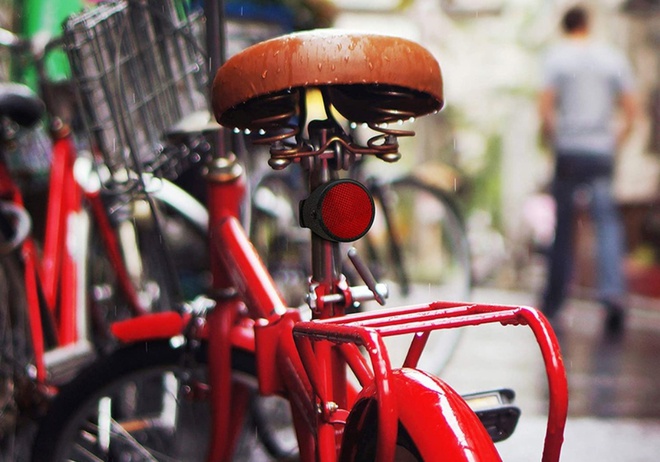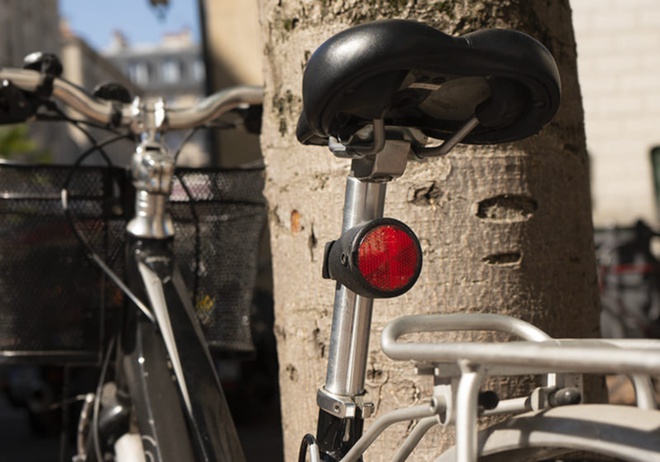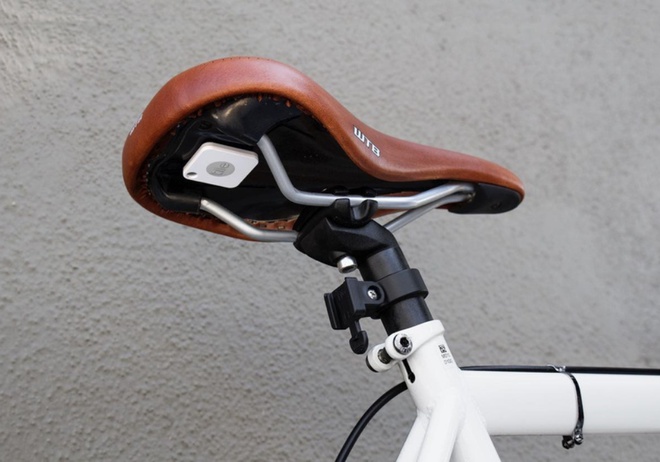Which GPS tracker for bike to choose?
If you're looking for advice on choosing the best GPS tracker for your bike, you've come to the right place. Here is an overview of the different technologies (requiring no subscription) that exist.

Reading time : 10 min
It's very frustrating when you can't find your bike where you left it, or worse, finding just the super strong lock you thought was foolproof. For this reason, several manufacturers of GPS trackers have started to market GPS trackers for bikes. You're interested in getting one? Find here all our tips and tricks to make the best choice at the best price.
There are insurances that cover bicycle thefts (generally they are optional insurances such as the "leisure guarantee"). Also consider storing your bike in a closed space or a secured area to avoid this situation as much as possible. Nevertheless, the GPS bike tracker remains the ultimate solution to find your beloved bike.
SUMMARY
The low power tracker: the best option for locating a bike

To locate a bike, it is better to use a GPS tracker working with low-power networks. Discover how this technology works, but also its advantages and disadvantages.
The low power GPS tracker for bikes: how does it work?
The no-subscription GPS tracker that is most suitable for locating a bike works with the Sigfox and Lora networks, also known as "low-speed networks". But do you know these networks?
The Sigfox and Lora networks
Sigfox and Lora have accompanied the emergence of connected products that surround us today in our daily lives. The Sigfox and Lora networks, also known as "LPWAN" or "Low Power Wide Area Network", have been THE revolution that delivers on a simple promise: very low cost and lower battery consumption compared to traditional cellular networks.
These networks are based on open frequencies that do not need to be licensed. It is this low operating cost that allows GPS tracker manufacturers to offer GPS trackers to the public with no subscription.
The low power GPS tracker for bikes
The low power GPS tracker works thanks to these new LPWAN networks. Manufacturers rely on these public frequencies to offer you more innovative GPS trackers at attractive prices.
The GPS tracker proposed by the manufacturer Invoxia is ideal for this purpose. It is sold at a very attractive price ($129 USD) with subscription included for the first years of use. It is perfectly adapted to a bike thanks to its small, discrete and handy format. The same technology is also used as a GPS tracker for cars in another format.
Strengths and weaknesses of the low power tracker
The advantages
The low power GPS tracker offers many advantages. First of all, you need to know what you will be using it for, in this case, locating your bike. This will determine the type of GPS tracker you purchase. The low power GPS tracker is ideal in this case for many reasons:
- It allows you to locate your bike with no limit in terms of distance: thanks to the antennas present on all the national territory, the tracker can send its position no matter where it is.
- Its purchase price is attractive: count about $129 USD to get a GPS tracker adapted to a bike at Invoxia. You will find cheaper trackers on websites like Amazon, but the subscription is included only for the first 6 months.
- You will not pay a subscription: thanks to the low power technology. This technology gives birth to the best GPS bike tracker in our opinion.
- A long autonomy of several months: no need to remove the device too often to recharge it. Low bandwidth networks keep their promise: a much longer battery life than conventional networks.
- You have an anti-theft alert: receive a notification on your cell phone through the mobile application provided by the manufacturer.
This mini GPS tracker for bikes offers a very reliable geolocation system. It is designed specifically for a two-wheeler of this type, is discrete, miniature, waterproof, and above all, it is undetectable or very hard to notice. In our opinion, this is the best GPS tracker to find lost bicycles. The free app will allow you to monitor suspicious movements of your bike, give you access to the position on the map and alert you in case of theft.
The disadvantages
The subscription-free low-speed GPS tracker has many advantages, but nothing is ever perfect. The major drawback of this device is that real-time tracking is not possible. Indeed, "public frequency" also means "network saturation". The messages sent by the tracker are almost always late, so the position of your bike will be updated with a delay of a few minutes (1 to 2 minutes on average).
Moreover, you will have a limited number of positions per day (still because of the public frequencies), so it is impossible to receive a position every minute for example, even with no latency in the transmission of messages.
On the other hand, locating a bike does not necessarily require real-time location. Indeed, in case of theft, to get your bike back, chances are you will not try to locate in real time the thief who is riding it in the streets. However, it will be interesting to know the destination of the malicious individual in order to recover your bike or to report it to the police. This individual, after having stolen the bike will inevitably end up immobilizing it. A position on demand is therefore sufficient in case of theft.
Why is this the best option for your bike?
This is the preferred option because of its many advantages. The low power GPS tracker fulfills all the necessary requirements to locate a bike. In case of theft, thanks to this tracking device, you will have no trouble finding your bike. Plus, it's a subscription-free GPS tracker that's as efficient as other subscription-based technologies. So why not jump on the opportunity?
The low power GPS tracker is an autonomous product because it can send its position wherever it is thanks to low power networks. The fact that it is a subscription-free product or at least included the first years of use is an important and very positive purchasing criteria for this type of device. In addition to offering a reliable location, its attractive price is another advantage for this option.
There are also subscription-free GPS trackers for cars and motorcycles. These GPS tracking tags work on the same principle, and simply have different formats adapted to each type of vehicle.
Things to check before buying a GPS
18 questions you need to ask yourself before buying a GPS tracker for your loved ones!
Other options to locate your bike

There are obviously other options to locate your bike with no subscription. Read about them in this section.
The GPS tracker without SIM card
Many people confuse GPS trackers without SIM card and subscription-free GPS trackers. They are not necessarily the same thing. Indeed, without SIM card actually refers to two types of products:
- GPS trackers connected to low power networks as we have just described above. For us, it is the best option to locate a lost bike.
- Then the GPS tracker connected to traditional networks (2G, 3G, 4G) which is not actually synonymous with no-subscription GPS tracker. Indeed, it requires a SIM card to operate, but it is not provided by the manufacturer, hence the name "GPS tracker without SIM card”.
Discover here the details of the GPS tracker connected to traditional networks also called "GPS tracker without SIM card".
How the GPS tracker sold without a SIM card works?
This tracker, sold without SIM card by the manufacturer, will actually need a SIM card to operate. It is therefore connected to the "standard" networks, the same ones you use for your smartphone. These are the classic cellular networks, the ones we use every day to send or receive messages and SMS (2G), go on the Internet (3G), or have access to broadband videos (4G) on our phones.
The antennas allowing access to all these services are present everywhere on the national territory and can be used and operated in exchange for a license fee. Operators pay an exploitation license, which allows them to market their subscription offers.
It is important to specify that the manufacturer does not provide a SIM card, so you will have to get one from the operator of your choice, and therefore pay the operating costs yourself each month. The GPS tracker "without SIM card" is not a no-subscription GPS tracker.
These paid networks guarantee to locate your bike with no distance limit and in real time. Real time is possible because there are no limits on the messages sent (since they are private networks). There are no slowdowns in the sending of messages, as is the case for low power networks for example.
Is the GPS tracker without sim card the right option for a bike?
The GPS tracker without SIM card is not the best option to locate a bike. It is actually nothing else than a GPS tracker with a hidden subscription. You will pay a monthly subscription to have access to a location with no distance limit and in real time.
The most important criterion to track your bike in case of theft is to obtain a location with no distance limit. Real time is not really necessary, because in case of bike theft, the most important thing will be to know the destination of the bike and not to track it in real time.
So yes, the "without SIM" GPS trackers will allow you to locate your bike efficiently and safely. However, a GPS tracker that works with low bandwidth networks and allows you to not pay a subscription also meets all the criteria for this type of product and is largely sufficient.
The Bluetooth bike tracker
This is an option that may seem comfortable to secure your bike in addition to your lock. The Bluetooth tracker is similar to a mini GPS, handy and inexpensive. Perhaps you're thinking of getting an Airtag or a Tile mate to locate your bike in case of theft?
Here are the details of this type of tracker as well as its advantages and disadvantages for this use.
How does the Bluetooth tracker work?
Bluetooth technology allows you to locate everyday objects in a very precise way. Today, thanks to this technology, it is possible to locate your wireless headphones that you have lost between the cushions of your sofa, or to find your keys that have fallen behind the TV cabinet.
These small Bluetooth trackers use this technology to send a signal that has a range of up to 150 ft (in a clear environment) to your mobile. Thus, you will always find the desired object. Beyond 150 ft, however, this device will not work.
The manufacturers of this type of tracker have introduced the concept of "Crowd GPS". The principle is simple: relying on all the people around you with the same Bluetooth GPS receiver to extend the signal beyond 150 ft. The GPS geolocation depends mainly on the community around your tracker. If no one has the same GPS receiver and their Bluetooth turned on next to your tracker, the GPS position cannot be updated. That's too many conditions to find a stolen bike, isn't it?
Bluetooth: an option to rule out for a bike
The Bluetooth tracker allows you to locate everyday objects. This is indeed the initial promise of the manufacturers of this type of connected keychain. It is not a device created to prevent theft, but rather a gadget designed to make your life easier on a daily basis: finding your keys more quickly in your apartment for example.
Nowadays, many people are trying to create new uses for these small connected objects: locating your dog or cat, finding a car or a bike. Indeed, its small size and its practicality are tempting. However, we do not recommend it for locating a bike.
Too many conditions are necessary for this device to work properly. The problem of the size of the community is far too important to allow such a device to help you find your bike in case of theft. Indeed, in a rural area with many obstacles or if there are not enough people around who have the same Bluetooth GPS receiver as you, then the tracker will not work.
In fact, real-time tracking is simply impossible. But the major problem in finding a stolen bike is the distance limit imposed by the Bluetooth GPS tracker. Indeed, waiting for a person with Bluetooth and GPS turned on to pass by the tracker is not acceptable to find your bike in time.
The particular case of GPS for pets

A very different use than tracking a bike
If you want to locate your dog or cat, then the criteria for buying a GPS collar will be very different than for a bike. A lost dog or cat is in perpetual movement. It is therefore essential to have access to a location with no distance limitation and in real time.
What type of GPS tracker is best for a dog or a cat?
It is important to keep in mind the essential features of a GPS tracker for dogs or GPS trackers for cats if you want a chance to find your furry friend: a location without distance limit and real-time tracking.
Only GPS collars for dogs and cats with subscription will meet these criteria (equipped with a SIM card) and allow you to find your pet quickly. It is important to define beforehand the use you want to make of your GPS tracker to make the best choice.
We do not recommend no-subscription GPS trackers for cats and dogs.
Conclusion
In order to locate a bike, the most important choice criterion for the tracker you choose is the location without distance limitation. Finding a stolen bike is quite possible thanks to no-subscription GPS trackers which work thanks to the low power network technology. This is the best option in our opinion. It is important to always define the use you want to make of your tracker before turning to one product or another.
Locating loved ones (seniors, children, or pets) is a purchase dealing with safety and deserves a different investment than locating vehicles or tracking a bike. On the other hand, to track an everyday object, the GPS tracker will not require as many features as for a bike. Bluetooth trackers are more than enough.
Continue reading our guide
This article is a part of a complete guide on the subject. Do not miss the next chapters.
Are you looking for the best GPS tracker ?
18 questions you need to ask yourself before buying a GPS tracker
